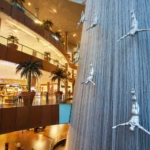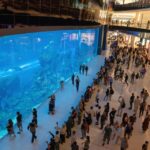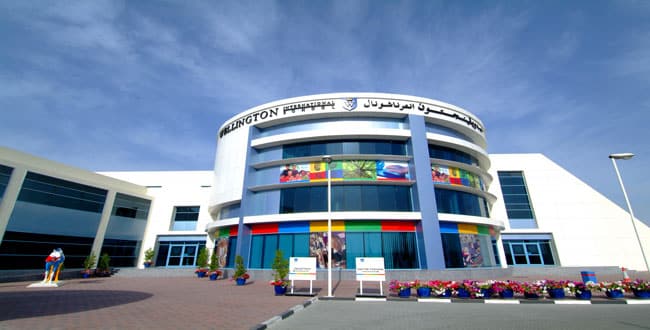
Dubai Schools
A Guide to Dubai’s School System
Probably one word can sum up the school and educational system in Dubai and that is diversity. The city is home to a multitude of nationalities and the school system is designed to cater for those needs, serving multiple curriculum, languages, along with rigorous standards and oversight. Dubai schools have imported dramatically over the last decade where excellent quality education from superb facilities is not the norm.
The school system in Dubai has grown dramatically over the years since I moved here and oversight and standards have also improved a lot as well. There has been a big investment in new schools, and major upgrades to existing ones as well.
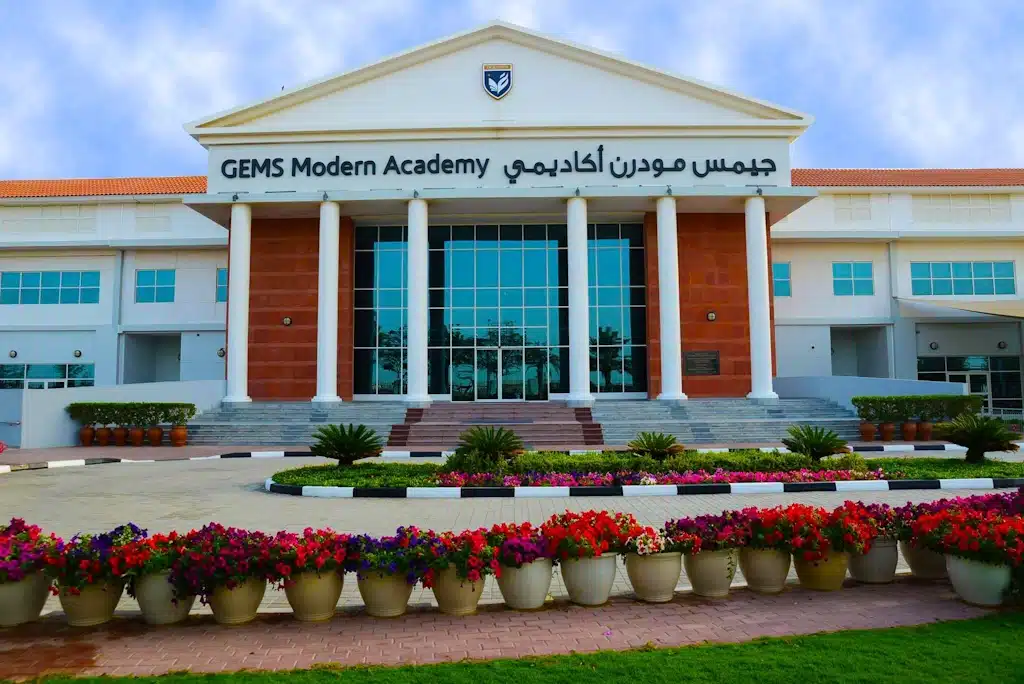
If you are planning to move to Dubai and are bringing your family with you, then this article will give you a good general introduction to what is available. The kinds of questions you might be asking include:
- Which curriculums are available?
- How much are the school fees?
- How to choose the right school?
- How are standards maintained?
- What facilities do the schools have?
This article will attempt to answer these questions and point you to the right places to find more details.
An Overview of the Educational System in Dubai
Here’s a breakdown of its structure:
Early Years Education: Pre-School
The foundation of the educational journey in Dubai begins with early years’ education, targeting children from birth to six years old. This stage focuses on holistic development, emphasizing social, emotional, cognitive, and physical growth. While it is not mandatory, many parents enroll their children in nursery schools or kindergartens to prepare them for primary education.
Primary Education:
At around six years of age, children transition to primary education, which typically spans from Grade 1 to Grade 6. The curriculum at this stage lays the groundwork for basic literacy, numeracy, and core subjects like science and social studies. Schools in Dubai, both public and private, offer primary education following the guidelines set by the Knowledge and Human Development Authority (KHDA), the regulatory authority for education in Dubai.
Secondary Education:
After completing primary education, students move on to secondary education, encompassing Grade 7 to Grade 12. The secondary level is crucial as it prepares students for higher education or the workforce. At this stage, students have the option to pursue either a general academic track or a vocational track, depending on their interests and career aspirations. The curriculum becomes more specialized, offering a broader range of subjects and extracurricular activities.
Higher Education:
Dubai is home to several prestigious universities and higher education institutions, offering a plethora of undergraduate, postgraduate, and doctoral programs. These institutions cater to diverse fields of study, including business, engineering, medicine, humanities, and more. Many universities in Dubai have forged partnerships with renowned international institutions, ensuring high-quality education and global recognition. Additionally, the Dubai International Academic City (DIAC) serves as a hub for tertiary education, hosting numerous universities and colleges from around the world.
Regulatory Framework:
The KHDA plays a pivotal role in regulating and overseeing the educational landscape in Dubai. It ensures that schools and universities maintain high standards of teaching, learning, and infrastructure. The KHDA conducts regular inspections, publishes school performance reports, and implements policies to enhance the overall quality of education. Moreover, it fosters innovation and encourages schools to adopt modern teaching methodologies and technologies.
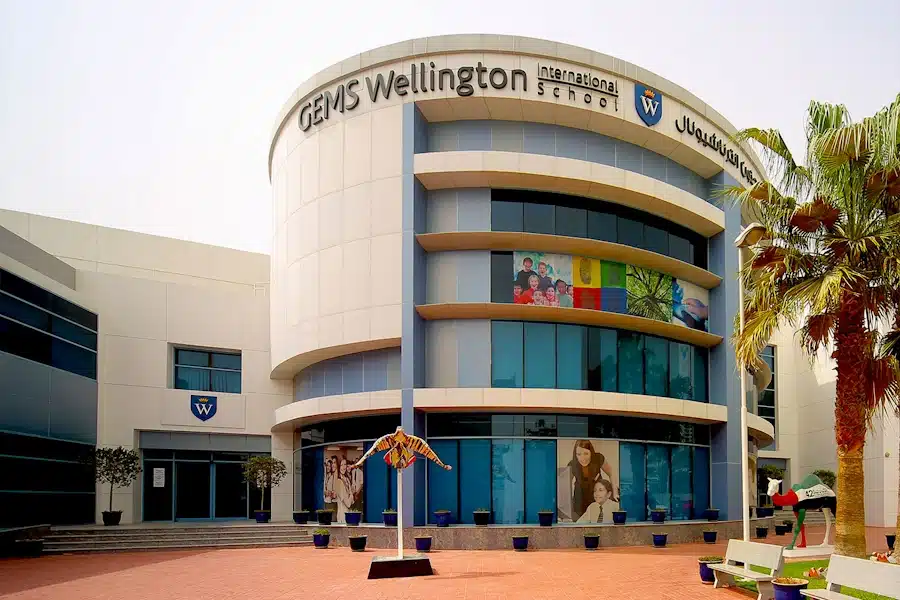
Different Curriculums to Choose From
The British System
Imagine stepping into a world of tradition and structure. The British curriculum emphasizes core subjects like mathematics, science, and English, building a strong academic foundation. Rigorous exams like GCSEs and A-Levels prepare students for top universities worldwide.
Advantages
The British curriculum is globally recognized and respected, facilitating smooth transitions for students relocating internationally
It emphasizes critical thinking, analytical skills, and independent research, preparing students for university-level education.
Many schools in Dubai offer the British curriculum, ensuring a familiar and standardized educational experience.
Disadvantages
Schools offering the British curriculum may have higher tuition fees due to the resources and training required.
Some critics argue that the curriculum may not sufficiently address local cultural and societal nuances.
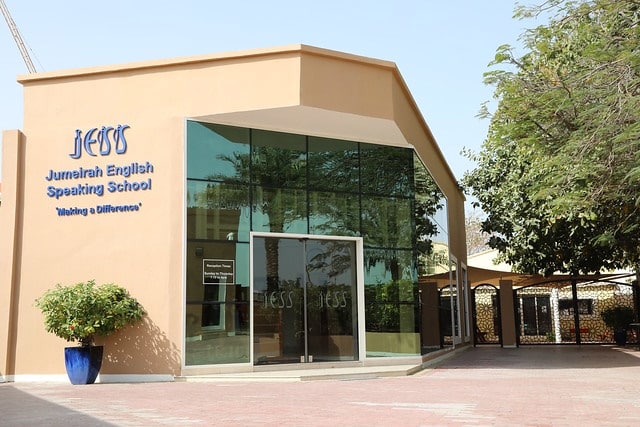
The American System
Dive into a dynamic world of hands-on learning and critical thinking. The American curriculum fosters creativity, problem-solving, and collaboration. Project-based learning and electives allow students to explore their interests and personalize their educational journey.
Advantages
The American curriculum offers a broad range of subjects and allows students to explore various disciplines.
It focuses on extracurricular activities, community service, and leadership skills alongside academics.
The Advanced Placement (AP) courses and SAT exams prepare students for college admissions in the US and other countries.
Disadvantages
The emphasis on standardized testing like SATs may create undue pressure on students.
Similar to the British curriculum, it may not fully integrate local cultural and historical contexts.
The International Baccalaureate (IB) Diploma Programme
Ascend to the pinnacle of academic challenge. The IB Diploma Programme is a rigorous two-year program known for its interdisciplinary approach, independent research, and emphasis on critical thinking. It prepares students for top universities worldwide and fosters well-rounded, globally-minded individuals.
Advantages
The IB program emphasizes holistic development, fostering critical thinking, research skills, and global awareness.
It is recognized by universities worldwide, offering students diverse higher education opportunities.
The curriculum encourages understanding and appreciation of different cultures and languages.
Diadvantages
The IB program can be academically challenging, requiring strong commitment and time management.
Some students may feel that the IB program lacks specialization in specific subjects compared to other curricula.
The Indian System
Embrace a holistic approach that nurtures not just academics but also values and well-being. The Indian curriculum integrates moral science, Indian culture, and physical education alongside core subjects. This holistic approach emphasizes character development and well-rounded individuals.
Advantages
It maintains a strong connection to Indian culture, history, and values.
The Central Board of Secondary Education (CBSE) and Indian School Certificate (ISC) are recognized globally, especially in South Asia and the Middle East.
Schools offering the Indian curriculum often have a range of fee structures, catering to diverse economic backgrounds
Disadvantages
Some critics argue that the Indian curriculum may not provide sufficient exposure to global perspectives and skills.
Traditional teaching methods in some schools may emphasize rote memorization over critical thinking.
There are of course other curriculums in Dubai as well such as Russian etc which can be found by Googling the relevant search terms. See the useful links section below for links to other national schools in Dubai.
Different Schools in Dubai
The table below shows 20 of the top schools in Dubai, but of course there are many more. It is important that you do your own research. This list can also change at notice.

Top 20 Schools in Dubai (2023-2024)
Please note: School rankings are subjective and depend on various factors. This list is based on a combination of KHDA ratings, academic performance, student-teacher ratios, and overall student well-being. Fees are approximate and may vary depending on grade level, siblings attending the same school, and scholarships or discounts.
| School Name | Curriculum | Fees (AED per year) | Location | Website |
|---|---|---|---|---|
| Dubai English Speaking College (DESC) | British | 57,000 – 78,000 | Jumeirah | https://www.dessc.sch.ae/ |
| Kings’ School Dubai | British | 63,000 – 92,000 | Al Barsha | https://kings-edu.com/ |
| Nord Anglia International School Dubai | British | 52,000 – 70,000 | Al Barsha | https://www.nordangliaeducation.com/our-schools/middle-east/united-arab-emirates/dubai |
| GEMS Dubai American Academy | American | 55,000 – 75,000 | Umm Suqeim | https://www.gemsaa-dubai.com/ |
| Dubai British School Jumeirah Park | British | 58,000 – 83,000 | Jumeirah Park | https://www.dubaibritishschooljp.ae/ |
| Jumeirah College | British | 45,000 – 65,000 | Jumeirah | https://www.gemsjc.com/ |
| Dubai College | British | 54,000 – 72,000 | Jumeirah | https://www.dubaicollege.org/ |
| Repton School Dubai | British | 53,000 – 76,000 | Nad Al Sheba | https://www.reptondubai.org/ |
| Lycée Français International Georges Pompidou | French | 48,000 – 68,000 | Oud Metha | https://lfigp.org/ |
| GEMS World Academy – Al Barsha | British | 54,000 – 74,000 | Al Barsha | https://www.gemsworldacademy-dubai.com/ |
| GEMS Wellington International School | British | 56,000 – 78,000 | Al Khail | https://www.wellingtoninternationalschool.com/ |
| Jumeirah English Speaking School (JESS) | British | 46,000 – 66,000 | Jumeirah | https://www.jess.sch.ae/ |
| GEMS Modern Academy | Indian | 35,000 – 55,000 | Al Barsha | https://www.gemsmodernacademy-dubai.com/ |
| Dubai International Academy | British | 45,000 – 65,000 | Emirates Hills | https://www.diadubai.com/ |
| Deira International School | British | 38,000 – 58,000 | Deira | https://www.disdubai.ae/ |
| Horizon English School | British | 42,000 – 62,000 | Al Barsha | https://hisdubai.ae/ |
| Kings’ School Al Barsha | British | 54,000 – 76,000 | Al Barsha | https://kings-edu.com/albarsha/ |
| Dubai English Speaking School (DESS) | British | 48,000 – 68,000 | Nad Al Sheba | https://www.dessc.sch.ae/ |
| Victory Heights Primary School | British | 38,000 – 58,000 | Victory Heights | https://www.vhprimary.com/ |
Please note: School rankings can be subjective and depend on various factors. This list is based on a combination of KHDA ratings, academic performance, student-teacher ratios, and overall student well-being. Fees are approximate and may vary depending on grade level and other variables.
Most private schools are owned by private companies that have been in Dubai for many years. The table below shows a list of some of the companies.
Top School Companies in Dubai (2023-2024)
| Company Name | No. of Schools in Dubai | Years in Dubai | Focus Curriculums | Website |
|---|---|---|---|---|
| GEMS Education | 50 | 1980 | British, Indian, American | https://www.gemseducation.com/ |
| Taaleem Education Group | 25 | 2004 | British, American, Indian | https://www.taaleem.com/ |
| Kings Education Group | 12 | 2003 | British | https://www.kingseducationgroup.com/ |
| Dubai British Schools | 10 | 1975 | British | https://www.dubaibritishschools.com/ |
| Jumeirah International Schools | 8 | 1975 | British | https://www.jisdubai.com/ |
| Nord Anglia Education | 7 | 1998 | British, IB | https://www.nordangliaeducation.com/ |
| GEMS Wellington International School | 6 | 2013 | British | https://www.gemswellington.ae/ |
| Repton Education Group | 5 | 2014 | British | https://www.repton.org/ |
| Horizon Education Group | 5 | 2008 | British | https://www.horizoneducationgroup.com/ |
| Dubai International Academy | 5 | 1975 | British | https://www.dia.ac.ae/ |
This list is not definitive, there are other companies. Please do your own research.
How Do School Fees Work In Dubai?
Tuition Fees Structure
- Annual Fees: Most schools in Dubai charge tuition fees on an annual basis, payable in installments (typically three to four terms per year).
- Additional Costs: Apart from tuition fees, parents may need to budget for additional expenses such as registration fees, admission fees, uniform costs, transportation, textbooks, school trips, extracurricular activities, and other miscellaneous charges.
Fee Regulation
- The Knowledge and Human Development Authority (KHDA) in Dubai regulates private school fees and conducts annual inspections to ensure schools maintain quality standards.
- Schools are categorized into different fee bands based on their KHDA rating, with each band having a maximum allowable fee increase percentage per year. Schools must seek approval from the KHDA for any fee adjustments.
Estimated Costs
- Primary and Secondary Education: For mainstream private schools offering curricula like British, American, or IB, annual tuition fees can range from approximately AED 15,000 to AED 90,000 or more, depending on the school’s ranking, facilities, and location.
- Premium Schools: High-end or premium schools, often associated with renowned international educational brands, may have tuition fees exceeding AED 100,000 per annum.
- Nurseries and Early Years: Fees for nurseries and early years’ education can vary widely, ranging from AED 10,000 to AED 50,000 annually, based on the institution and services provided.
Payment Plans and Scholarships
- Many schools in Dubai offer flexible payment plans and sibling discounts to support families with multiple children.
- Some schools also provide scholarships or financial aid based on academic merit, talents, or specific criteria.
Transparency and Disclosures
- Schools in Dubai are required to disclose their fee structure, including all associated costs, to parents during the admission process.
- The KHDA regularly publishes school inspection reports and fee guidelines, promoting transparency and informed decision-making for parents.
KHDA The Regulatory Authority in Dubai
What is the KHDA?
The Knowledge and Human Development Authority (KHDA) is the educational quality assurance and regulatory authority in Dubai, United Arab Emirates. Established in 2006, the KHDA plays a pivotal role in ensuring the quality of education and fostering excellence in schools, universities, and other educational institutions across Dubai.
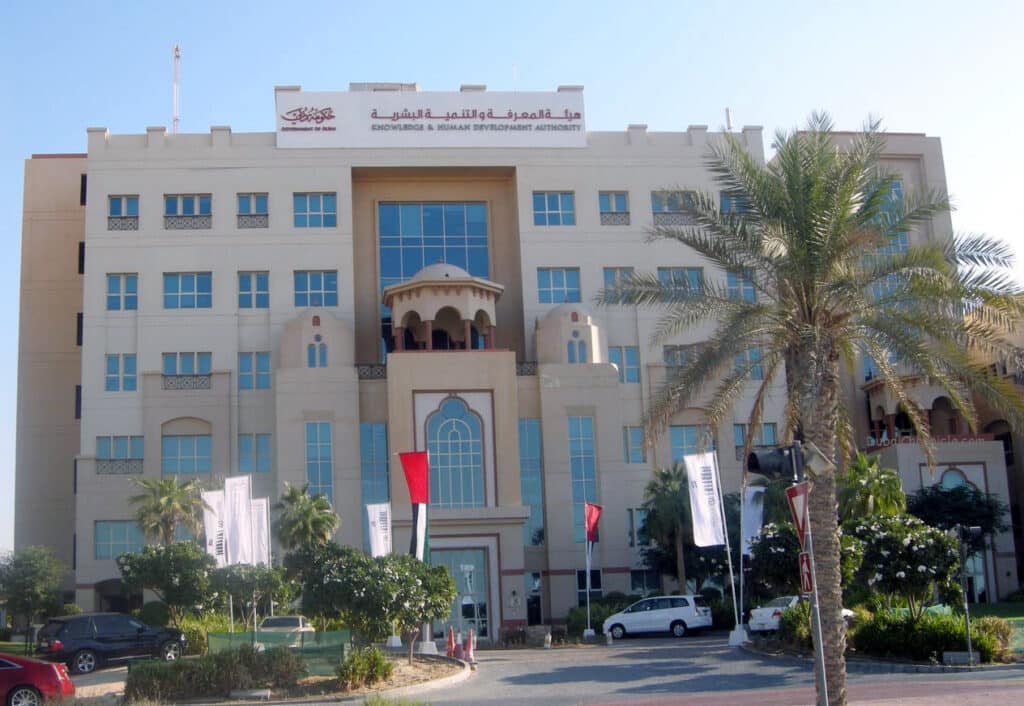
Regulation of Schools
The KHDA regulates private educational institutions in Dubai, overseeing various aspects to ensure they meet established standards and deliver high-quality education. Its regulatory functions encompass:
- Licensing and Accreditation: The KHDA grants licenses to educational institutions, ensuring they meet specific criteria and standards before commencing operations.
- Inspections and Monitoring: The authority conducts regular inspections of schools, assessing their performance, teaching quality, facilities, curriculum delivery, and overall adherence to regulations.
- Compliance and Enforcement: The KHDA ensures that schools comply with established guidelines, addressing any shortcomings or issues through remedial actions, penalties, or other regulatory measures as necessary.
Setting Standards
The KHDA is responsible for setting and updating educational standards and benchmarks in alignment with international best practices and the evolving needs of Dubai’s educational landscape. This involves:
- Curriculum Development: Collaborating with educational experts and stakeholders to develop and refine curricula that align with global standards and cater to diverse student needs.
- Quality Assurance: Establishing frameworks and benchmarks for assessing and maintaining the quality of teaching, learning, assessment methods, student outcomes, and overall educational experiences.
Checking and Ranking Schools
The KHDA evaluates and ranks private schools in Dubai based on comprehensive inspections and assessments. The ranking process involves:
- Performance Evaluation: Conducting rigorous inspections and evaluations of schools across various parameters, including teaching quality, student achievement, leadership, governance, facilities, and community engagement.
- Rating System: Assigning schools with a rating based on their overall performance and compliance with KHDA standards. Schools may receive ratings such as Outstanding, Very Good, Good, Acceptable, or Weak, reflecting their quality and areas for improvement.
- Transparency and Reporting: The KHDA publishes annual school inspection reports and ratings, providing parents, educators, and stakeholders with transparent insights into school performance, strengths, areas for development, and recommendations for improvement.
In summary, the KHDA plays a pivotal role in shaping and enhancing Dubai’s educational landscape, ensuring that educational institutions maintain high standards of quality, excellence, and innovation. Through its regulatory, assessment, and quality assurance initiatives, the KHDA fosters a culture of continuous improvement and excellence, ultimately benefiting students, parents, educators, and the broader community in Dubai.
Embracing Challenges, Cultivating Opportunities: The Future of Dubai’s Education System
Enhanced Focus on STEM and Entrepreneurship:
- To align with the UAE’s economic diversification goals, Dubai’s education system is placing a strong emphasis on STEM (science, technology, engineering, and mathematics) fields
- Additionally, fostering entrepreneurial mindsets and skills is becoming a priority to nurture a generation of innovators and job creators
Deeper Integration of Technology:**
- The use of technology in education is expected to expand significantly, transforming teaching and learning experiences
- This includes the adoption of Artificial Intelligence (AI), virtual reality (VR), and augmented reality (AR) to personalize learning, enhance engagement, and provide immersive learning environments.
Greater Emphasis on Lifelong Learning:
- Recognizing the rapid pace of change in the modern world, Dubai’s education system is shifting towards a lifelong learning model
- This means providing opportunities for continuous skill development and upskilling throughout one’s career to ensure individuals remain adaptable and competitive in the workforce.
Video Tour
An overview of 10 of the top schools in Dubai. There are many many more!
Conclusion
Navigating the diverse landscape of Dubai schools can be exciting, but daunting. Remember, finding the perfect fit for your child requires meticulous research, open communication, and a spirit of adventure. With this guide as your compass, you’re sure to discover an educational oasis where your children can blossom, build, and embark on their own desert journey of learning and growth.
The choice of school will also depend on where you are living as commuting can be challenge in Dubai’s busy traffic. Take time to explore all the options. Many schools in Dubai get filled up quickly but they have waiting lists so you add you name to them. Go and tour the school with your children as well as it’s important that they get a feel for it.
FAQ
How do I choose the right curriculum for my child?
Matching your child’s learning style and academic goals to the strengths of each curriculum is crucial. Consider consulting educational experts, visiting schools, and speaking to current parents to gain firsthand insights.
What’s the language of instruction in Dubai schools?
While English is the primary language in most private schools, some offer bilingual programs or cater to specific languages like French or Indian. Public schools primarily use Arabic as the medium of instruction.
How much do private schools in Dubai cost?
Fees vary widely depending on factors like curriculum, facilities, and reputation. Expect a range from AED 15,000 to AED 100,000+ per year, with scholarship and payment plan options available in some cases.
Are public schools accessible to expats?
Access to public schools for expats is limited and requires fluency in Arabic. Private schools offer the wider range of options for most expat families.
How does the KHDA inspection system work?
The KHDA inspects schools on various parameters, including teaching quality, facilities, student achievement, and overall well-being. Their reports provide a valuable resource for comparing schools and evaluating their performance.
What extracurricular activities are available in Dubai schools?
The variety of extracurricular activities is astonishing, ranging from sports and music to robotics, coding, and leadership programs. Many schools also offer field trips, cultural events, and community service opportunities.
How does the desert climate affect school life?
Most schools are well-equipped with air conditioning and shaded outdoor spaces to combat the heat. Some even adjust school schedules during the hottest months to prioritize indoor activities.
What about the transition to a new school system?
Moving to a new school system can be challenging, but many schools offer dedicated support for new students, including language assistance, buddy programs, and orientation sessions.
What are the career prospects for teachers in Dubai?
Dubai offers attractive salaries and professional development opportunities for qualified teachers, making it a desirable destination for educators from around the world.
Is Dubai a safe place to raise a child?
Dubai boasts a very low crime rate and a strong focus on child safety. Schools prioritize security measures and provide a safe and nurturing environment for students.
Useful Links
- The school regulator is the KHDA, the Knowledge and Human Development Authority.
- For school rankings you can search for any school and get rankings and other information.
- For information on Dubai itself. Here is an introductory guide.
- For information about residence and visit visas.
- Your first experience of Dubai will be through the airport.
- A guide to banking in Dubai.
- A guide to healthcare in Dubai for your family.
Key Takeaways:
Dubai’s diverse school system offers a plethora of options for expat families, with curriculums ranging from British and American to Indian and the IB Diploma Program. Choosing the right school requires careful consideration of your child’s needs, learning style, and aspirations. Public schools cater primarily to Emirati citizens, while private schools offer wider access for expats, with varying fees and facilities. The KHDA inspection system provides valuable insights into school performance and quality. Dubai schools prioritize technology integration, extracurricular activities, and student well-being. While adapting to a new school system can be challenging, support systems and cultural experiences make it a rewarding journey. Remember, finding the perfect educational oasis in Dubai is an exciting adventure. With knowledge, preparation, and a touch of desert magic, you’re sure to discover the ideal haven where your children can learn, grow, and thrive.



